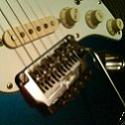|
Weird question, when I use headphones is it better to plug into my interface or my monitors? I just got my new pair in and wanted to see if one way is better than another.
|
|
|
|

|
| # ? May 9, 2024 23:45 |
|
not knowing which interface or monitors, my inclination is that interface is better just because it's one less set of components to color the signal. honestly, as long as your equipment is decent and you set up your gain staging right, the difference should be negligible.
|
|
|
|
I guess plugging into the monitors could have the advantage of auto muting them. I'd look at that sort of convenience for choosing one over the other.
|
|
|
|
I have a Scarlett Solo interface, and some pretty cheap M Audio monitors. So I guess it's really preference then?
|
|
|
|
While I'm asking questions, how do people usually record in terms of how they set their sound up? I notice a lot of people use headphones. Are they listening to everything, their guitar they are recording, drum track, bass(if it's already tracked) in their headphones? Or do they somehow rig up the drums/metronome to come in through their earphones and guitar through their monitors? I kind of feel like the last one might work good, if there is a way to do that. Before I bought these headphones, I messed around with EZ Drummer some yesterday, but I have having a tough time getting my guitar sound balanced with the sound of the drums so I could hear both clearly. Haven't tried it with headphones yet, I imagine it would be easier than with monitors at least. My living room is pretty echo-y so I bet the sounds tend to blend more than they normally would when I play through monitors.
|
|
|
|
Iíve been playing guitar for about 10 years off an on, but hadnít really played much since the first 2 or 3 years. During the pandemic I got divorced so I kind of dove back into playing and started learning how to sing and play a bit and itís been really fun! This is mostly on acoustic. I also started learning piano and decided Iíd be interested in recording some stuff and messing around with some music production / recording, but I know basically next to nothing. I feel like when I google or go on YouTube I just run into a lot of sponsored content and itís all very overwhelming. Anyway, Iíve gathered that a shure sm57 is a good place to start with a microphone for the guitar, but seems like lots of people recommend an additional mic if I want to play and sing at the same time. Is that true? If so, I generally have an idea it should be a compressor mic with a pop filter and then an audio interface like a Scarlett 2i2 to plug it all into my computer. I donít mind spending $4-500 in total but Iím just wondering if this all makes sense, and if thereís any recommendations for a mic for vocals, or any replacements on the above? Sorry if this is a dumb question thatís already been covered, I tried searching the thread but didnít find anything.
|
|
|
|
Drunk Driver Dad posted:While I'm asking questions, how do people usually record in terms of how they set their sound up? I notice a lot of people use headphones. for the most part i use headphones when i'm doing more precise recording for the reasons you mentioned (easier to hear everything you need to without the room muddying it up), but the only reason you really need headphones is to prevent mic bleed and feedback. if you're going DI then you can get away with using monitors, and i tend to do that when i'm recording synths. in terms of what you're actually hearing, it really depends on what you as a performer need, so you dial it in the same way as on-stage monitors for playing live. for me it's usually a guide track and metronome to get drums down, then just the drums to get bass down, and those two serve as the foundation for everything else. i mostly keep everything else mixed low for recording unless i really need to tell how whatever i'm tracking at the moment is interacting with specific other parts. Rorobb posted:
good for you for getting back into it! if you want to specifically record yourself singing and playing at the same time rather than doing one at a time and combining them afterward, two mics is incredibly helpful, although not entirely necessary. a lot of early recorded music recorded entire bands with a single mic, it just gets waaaay harder the more you try to do with only one. sound on sound had a great article not too long ago that gave a good rule of thumb, which is that your mic should be about the same distance away from your sound source as the sound source is large. so, like, for an acoustic guitar, you want to capture the while top vibrating and creating sound (not just the sound hole) and also maybe a little neck, so if that's 2.5 feet, you set the mic 2.5 feet away, aimed so that all your elements are in balance, which in this case is pretty centered. once you add your mouth, suddenly that becomes 3 or 4 feet, and then you have to work out where to aim the mic so that neither your voice nor guitar overpowers the other. and if your room is untreated, you also have to worry about reflections and reverb muddying things up, and that gets worse and worse the further from the sound source you get. the good news is that the sm57 is a great all around mic, and if you picked up a second one that'd work for vocals. you can get a nicer condenser mic if you want, but a dynamic like the 57 (or a 58, which is the same mic with a different windscreen specifically for vox) is nice for this sort of use because they tend to drop off in sensitivity quicker than condensers, which means you'll have a little less bleed and more control over balance in your final mix. you won't have perfect seperation by any means, and you'll need to check your mic placement for phasing (which is a whole different beast that i am always still working on) but it will definitely provide a little more flexibility in the recording process. i think the 2i2 is a pretty standard suggestion for a two-mic setup. i use one of focusrite's older, bigger interfaces and i've always been happy with it, so i imagine their new stuff is as decent as everyone says and would be a good option!
|
|
|
|
Rorobb posted:Iíve gathered that a shure sm57 is a good place to start with a microphone for the guitar, but seems like lots of people recommend an additional mic if I want to play and sing at the same time. Is that true? If so, I generally have an idea it should be a compressor mic with a pop filter and then an audio interface like a Scarlett 2i2 to plug it all into my computer. I donít mind spending $4-500 in total but Iím just wondering if this all makes sense, and if thereís any recommendations for a mic for vocals, or any replacements on the above? The best video I've seen for recording acoustic guitar is from Jake Lizzio. In the video he's using (2) SM57s to get a stereo effect with the guitar, so if he was also singing he'd need 3 mics. Probably 2 SM57s for the guitar and a condenser for the vocals. I'm sure that for you to have fun recording, 1 mic on the guitar and 1 for vocals would be totally adequate and therefore the Scarlett 2i2 will work. But just know that if you ever want to take it a step further with recording, you'll most likely want a third or fourth XLR port in your interface. Ok wait, I just checked prices on the 18i8 3rd gen and it's over 400 bucks now??? When I got mine before the pandemic it was like $100 over the price of the 2i2. https://www.youtube.com/watch?v=iu1P-cAhWJw
|
|
|
|
I just got a Behringer 1820 as an upgrade from my 2i2 to get more inputs. Edit: I couldn't justify the cost/benefit of FocusRite vs Behringer at that level. dexefiend fucked around with this message at 17:57 on Aug 4, 2021 |
|
|
|
Thanks for all the great feedback! Knew I should ask goons  going to make a decision this weekend probably going to make a decision this weekend probably
|
|
|
|
I think I would rather have a digital mixer like the sound craft mtk than the 18i8. Itís a little more money but you get more channels, faders, daw control stuff like that
|
|
|
|
|
any tips for getting a decent clean electric guitar sound? I'm recording directly into FL Studio with a cheap interface. Trying to use amp sims and EQ to make it sound nice but it just doesn't so far (admittedly I'm not particularly proficient with either). even as I am recording it clean with low gain it still sounds vaguely crunchy when I play the chords fairly hard
|
|
|
|
Try playing through the ampsim without a cab after it, this often works for cleans. What sort of guitar are you recording? I'm gonna assume as you said re; low gain you aren't clipping your input, make sure it's set so it's just before peaking when you play your hardest. Maybe try a high pass at around 100-120 hz before the amp so you aren't getting a bunch of bassy frequencies you don't want clipping the amp when strum harder.
|
|
|
|
Drunk Driver Dad posted:Weird question, when I use headphones is it better to plug into my interface or my monitors? I just got my new pair in and wanted to see if one way is better than another. anecdotal evidence, sample size 1, all that: i have a cheap pair of m-audio monitors and i just did an a/b comparison on a couple of songs (SSL 2+ interface, Beyerdynamic DT770 headphones). i think there might be a tiny little bit of a difference (in panorama/width/stereo picture, for whatever reason), but it's subtle enough that i'm not actually sure i'm not deceiving myself. if there is any difference it's minimal however, the phones output on my interface is about twice as loud on max volume as the phones output on the speakers, so there's that
|
|
|
|
Paperhouse posted:any tips for getting a decent clean electric guitar sound? I'm recording directly into FL Studio with a cheap interface. Trying to use amp sims and EQ to make it sound nice but it just doesn't so far (admittedly I'm not particularly proficient with either). even as I am recording it clean with low gain it still sounds vaguely crunchy when I play the chords fairly hard Assuming you've checked your gain staging? Is the crunch in the dry signal before you pass it through the amp sim VST, or after? If it's before, try turning down your guitar and/or interface. If it's after, dig into the amp sim. Most guitar amps have built-in distortion/gain, and the sim you're using may have that turned on by default. If it's on, try turning it down. Try adding effects. Some things that make a nice "clean" electric guitar sound are chorus (adds slightly detuned copies to make it sound big), reverb (simulates room echo to make it sound big), delay (lets you do jangly self-harmonising stuff -- optional), and compressor (tightens up the sound ). Compressor could also help with levelling out the sound if you're playing chords too hard. But I'm kind of an amateur. The guitar thread might have better suggestions for your signal chain.
|
|
|
|
Headphones from the monitors is going to be another amp stage than just direct mixer headphone amp. Thatís the main difference I can think of
|
|
|
|
|
A crystal clean DI guitar should just be a case of guitar in, gain low, make sure it's on a Hi-Z setting and then play. It doesn't matter if the signal is low, you can bump it up later. As was mentioned gain staging is important. If there's always crunch then my random guess is your gain is too high on the pre in combination with your pickup output, or it's not a super clean pre. The latter is unlikely unless you're using like a cheap 80s/90s analog mixer. Which can be cool as gently caress, but not what you want for this. As long as the signal comes through just keep the gain low will probably be a benefit.
|
|
|
|
I set up a simple patch bay so that I could have all 4 of my synths up at once and never have to move cables around when I want to record. I have an RME Babyface Pro FS as my interface, a Presonus DP88 for ADC and input expansion, and a Samson S-Patch for getting it all together. An ADAT cable OUT from the DP88 to the IN on the Babyface for the additional 8 channels. From the DP88 I have a DB25 snake from the Line Inputs (ADC Direct) Bal port to the S-Patch. I have the synths plugged into those patches. Everything works - I have all of the instruments plugged in and working at once and I can record in my DAW. The problem is that the highest level I'm getting when I turn volume up to the max on all the synths is around -33db. The DP88 manual says the DB25 connector is for use with line-level devices. These inputs are scaled to accept line-level signals up to +18 dBFS. Where am I losing so much signal? Any thoughts?
|
|
|
|
I want to sing while I play piano and have voice and digital piano processed by effects in a DAW. My piano has MIDI and I have NI Noire so that's no problem and I have an audio interface but am I right in thinking that an SM58 is a good idea? I don't want to deal with pop shields particularly and I'm not looking for studio quality.
|
|
|
|
so ive been able to hack together some decent recordings with my Presonus Audiobox, the little Left-Right two channel guy. I've been Micing my amps, direct in too, and some vocals through my guitar pedal board. it's all been okay, but just okay. this Audiobox really can't be depended on as a preamp, right? i'm finding the whole "gain staging" part of recording is really weird with my simple setup. not sure if its just me. any recommendations for the next step up for a digital mixer? it makes me kinda sad to buy hardware that mothballs my Audiobox but w/e part of me just wants to get a cheapo analog mixer with stereo out, plug that into the audiobox, idk. im trying to put together a somewhat mobile recording setup, because im starting to work as a soundguy 20 Blunts fucked around with this message at 19:39 on Aug 9, 2021 |
|
|
|
My trusty Soundcraft Signature 12 MTK took some damage and has bitten the dust after 5 years of service whatís todayís recommended multitrack USB mixer? I was initially just going to jump up to the Soundcraftís bigger sibling, the 22MTK, it seems to still rank favorably against comparable TASCAM/etc, but at ~$900 and already 5-6 years on the market Iím wondering if thereís anything newer and maybe more competitive on the market these days.
|
|
|
|
This is kind of a long shot, but has anyone dealt with using Cubase and a Steinberg audio interface on a Macbook Pro, and in particular any issues with getting Cubase to talk to the interface? I feel like there's something simple I'm missing, but I'm hitting a brick wall. I use a UR44 on a windows machine, with the Steinberg drivers, and it's reliable and easy to use. Once I got used to some of the quirks in Cubase about setting up projects and how to configure my tracks, it's been pretty easy to use. My dad recently got a UR44C to use on his MacBook Pro, intending to use it with the copy of Cubase LE that comes with the interface. I'm visiting and trying to get it set up for him, and I dunno if it's a Cubase thing or a Mac thing but I can't get the drat DAW to record audio, or even reflect that audio is coming through the interface. I have the interface powered through the AC adapter, and a guitar DI'd into input 1, and I have both headphones and monitors set up through the headphone jack and Main Outs respectively. I can hear the guitar through both, so I feel confident the interface itself works. I can check on the Mac for audio devices and I see the UR44C listed there, and I can set it to handle input and output. I can run dspMix, and I can monitor the guitar and apply reverb and distortion, so I feel confident the interface is communicating with the Mac in some way. I can boot up Cubase and it will let me set up, say, a multi track recording project, and I don't get any error that there's no audio device, so I think Cubase somehow knows the interface is there. In Studio Setup I can see that the Steinberg UR44C drivers are selected and input 1 is active. But I don't see any other indication on Cubase that it hears the guitar. No signal shows up in the mix console, even though I have input 1 selected for input and Main Mix selected for output. When I press record, I don't record any sound. Toggling record enable or monitoring doesn't change anything. When I apply effects through the channel strip nothing happens -- I'm still left monitoring a clean signal through the interface. For all intents and purposes, It feels like Cubase simply has no idea that the interface is there or that sound is going into it. What the hell is going on? I don't even know what to Google at this point, because the help videos I'm getting are all about how to plug instruments into the interface, and not about what to do if Cubase seems unable to talk to the interface. Is this some weird Mac thing I'm missing? The ways I've done it before have all been on Windows machines. Is this some wrinkle of Cubase that I'm unaware of? Any advice or links to videos or tutorials would be appreciated, I'm kind of at my wits end and I feel bad as I talked up on the virtues of the Steinberg interface and Cubase to my dad, showing him it on my windows laptop, but at this point he probably wishes he had bought a Tascam 12 or something.
|
|
|
|
Am not familiar with any part of that setup, but I watched this video and it seems that after Studio > Studio setup, he's faffing around in Studio > Audio connections a bit. Maybe that gets auto filled with the onboard audio or something? Plus then it appears some of those settings are saved per project instead of globally? Idk, but something to look at.
|
|
|
|
Flipperwaldt posted:Am not familiar with any part of that setup, but I watched this video and it seems that after Studio > Studio setup, he's faffing around in Studio > Audio connections a bit. Maybe that gets auto filled with the onboard audio or something? Plus then it appears some of those settings are saved per project instead of globally? Idk, but something to look at. Thanks. That video seems useful -- I'll try that out I guess part of what's throwing me is I just instinctively assumed getting audio devices working on a Mac would be easier than doing it on a PC, and so far the MacBook Pro is giving me much more trouble than my windows laptop ever did.
|
|
|
|
Might be worth trying things out in GarageBand too. I never could figure out Cubase, but my Steinberg UR22 has been just fine with GarageBand. Itíd help eliminate any rare but possible hardware issues if nothing else.
|
|
|
|
nitsuga posted:Might be worth trying things out in GarageBand too. I never could figure out Cubase, but my Steinberg UR22 has been just fine with GarageBand. It’d help eliminate any rare but possible hardware issues if nothing else. Thanks. Also a good idea. I'll have my dad install GarageBand (which he must have uninstalled at some point) and try that. Just feel bad since I have many times extolled the virtues of working in Cubase and now he probably wishes he'd just stuck to tape.
|
|
|
|
Mac + GarageBand/Logic is seriously the smoothest thing in the world, itís worth it. I never clicked with DAWs until I embraced those. GarageBand is super powerful for a free program too, you can really grow in that ecosystem even if you donít commit to Logic.
|
|
|
|
Kilometers Davis posted:Mac + GarageBand/Logic is seriously the smoothest thing in the world, itís worth it. I never clicked with DAWs until I embraced those. GarageBand is super powerful for a free program too, you can really grow in that ecosystem even if you donít commit to Logic. This really can't be overstated. The level at which things "just work" with Mac+Logic... It's so wonderful.
|
|
|
|
Scarf posted:This really can't be overstated. The level at which things "just work" with Mac+Logic... It's so wonderful. Yeah for real. I almost said those exact words but didnít want to sound cliche or too apple preachy, haha. Itís really true though! I couldnít be happier with the combo.
|
|
|
|
I really wanted to buy Logic but they wouldn't let me cause my Mac mini is too old so I got reaper instead
|
|
|
|
I fuckin love Reaper and it is awesome
|
|
|
|
Reaper is my DAW of choice in Windows. I tried Cubase since it came with an amp, but it just never clicked for me. Before that I was using Ardour on a Linux install, which worked about as well as you could expect for a full featured DAW on Linux.
|
|
|
|
gear Q's: -what are the most neutral, entry level headphones for monitoring/mixing? DT-770 isolated sounds nice cause then i could crank my amp while wearing cans. but maybe that has a different sound signature. maybe i should just get The Sony MDR 7506's(tm)? youtube isn't helpful for this -i have owned an OnStage mic stand and it pretty much blew, and didn't hold my condenser mic. it was a boom stand. what are the cheapest good mic stands? i have an SM58 and an AT2020, ideally i'd have a desktop one, for sitting at my desk and for when i'm using one on the floor, and then a standing one, for vox/voice lessons
|
|
|
|
There are plugins like Bluecat's Rehead that will give you EQ curves to compensate for cheaper studio headphones' natural EQ curves (I typically use Rehead with my Akg 240s), but it's also a good idea to listen back to what you make on your daily headphones that you are most familiar with. My normal gaming headphones let me catch some resonance issues not immediately present on my Rehead/240 combo because I listen to music through them daily.
|
|
|
|
OutOfPrint posted:There are plugins like Bluecat's Rehead that will give you EQ curves to compensate for cheaper studio headphones' natural EQ curves (I typically use Rehead with my Akg 240s), but it's also a good idea to listen back to what you make on your daily headphones that you are most familiar with. My normal gaming headphones let me catch some resonance issues not immediately present on my Rehead/240 combo because I listen to music through them daily. well right now i only have HD6XXís and i generally love treble, so iím looking for something closer to neutral regardless
|
|
|
|
Go for some 7506s. Theyíre a pretty versatile pick, and they sound fine to my ears. They clamp pretty good though, so be prepared. My other choice would be some Beyer Dynamics, but I think either will do what youíre up to well.
|
|
|
|
nitsuga posted:Go for some 7506s. Theyíre a pretty versatile pick, and they sound fine to my ears. They clamp pretty good though, so be prepared. My other choice would be some Beyer Dynamics, but I think either will do what youíre up to well. yeah i'm leaning toward the DT-770s if they're nice and flat, since there's a model that isolates for monitoring (if that's any good?)
|
|
|
|
Get the 770s theyíre neutral enough, sound awesome, isolate/block out sound nicely and feel very comfy. Really surprisingly good open wide sound stage for closed headphones too.
|
|
|
|
I watched a thing on YouTube about headphones being binaural instead of stereo and mixing side vs middle instead of stereo vs mono so Iím very confused about reality today
|
|
|
|
|

|
| # ? May 9, 2024 23:45 |
|
Well they are binaural since in a stereo listening field your right ear still hears what the left ear is hearing more of, and vice versa. Since headphones play each sound into each ear directly, it's been pretty common for decades to use some kind of cross-talk mechanism to put a small portion of what the left ear hears in the right channel (... and vice versa). Fancier solutions try to mimic the subtle differences in how the ears would hear each thing, or even put your headphone listening into a sort of virtual acoustic space, and they work alright. I am not sure how exactly that relates to the stereo vs. mono, or mid vs. side thing precisely, but I'm sure that's just a failure of intuition on my part and it makes perfect sense in context. I will say, mid/side is incredible and useful and awesome, and something you can make very extensive use of in modern recording all the way through to the mastering step. In general you want to audition your music across various things so that you get as accurate a picture as you can of how it will be reproduced under various circumstances. When I mix with headphones suddenly my eyes are way more on the phase correlation meter and in general I watch my metering a lot when working with cans, which I feel helps.
|
|
|

































